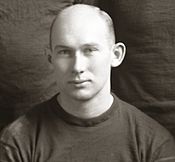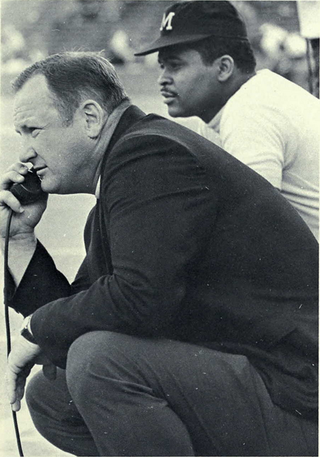
Glenn Edward "Bo" Schembechler Jr. was an American college football player, coach, and athletic administrator. He served as the head football coach at Miami University from 1963 to 1968 and at the University of Michigan from 1969 to 1989, compiling a career record of 234 wins, 65 losses and 8 ties. Only Nick Saban, Joe Paterno and Tom Osborne have recorded 200 victories in fewer games as a coach in major college football. In his 21 seasons as the head coach of the Michigan Wolverines, Schembechler's teams amassed a record of 194–48–5 and won or shared 13 Big Ten Conference titles. Though his Michigan teams never won a national championship, in all but one season they finished ranked, and 16 times they placed in the final top ten of both major polls.

Lloyd Henry Carr Jr. is a former American football player and coach. He served as the head football coach at the University of Michigan from 1995 through the 2007 season, replacing Gary Moeller. Under Carr, the Michigan Wolverines compiled a record of 122–40 and won or shared five Big Ten Conference titles. Carr's undefeated 1997 team was declared the national champion by the Associated Press. His record coaching against top ten-ranked opponents was 20–8. Carr was inducted into the College Football Hall of Fame as a coach in 2011.

Herbert Orin "Fritz" Crisler was an American college football coach who is best known as "the father of two-platoon football", an innovation in which separate units of players were used for offense and defense. Crisler developed two-platoon football while serving as head coach at the University of Michigan from 1938 to 1947. He also coached at the University of Minnesota (1930–1931) and Princeton University (1932–1937). Before coaching, he played football at the University of Chicago under Amos Alonzo Stagg, who nicknamed him Fritz after violinist Fritz Kreisler.

Gary Oscar Moeller was an American football coach best known for being head coach at the University of Michigan from 1990 to 1994. During his five seasons at Michigan, he won 44 games, lost 13 and tied 3 for a winning percentage of .758. In Big Ten Conference play, his teams won 30 games, lost 8, and tied 2 for a winning percentage of .775, and won or shared conference titles in 1990, 1991 and 1992. He left Michigan in 1995 following a drunken incident. Moeller also coached in professional football and was the head coach of the Detroit Lions for part of the 2000 season. He was the father of former Cleveland Browns offensive line coach Andy Moeller.

Benjamin Oosterbaan was a three-time first team All-American football end for the Michigan Wolverines football team, twice All-American basketball player for the basketball team, and an All-Big Ten Conference baseball player for the baseball team. He is widely regarded as one of the greatest football players in Michigan history. He was selected by Sports Illustrated as the fourth greatest athlete in the history of the U.S. state of Michigan in 2003 and one of the eleven greatest college football players of the first century of the game.

Harry George Kipke was an American football, basketball, and baseball player and coach. He was the head football coach at Michigan State College in 1928 and at the University of Michigan from 1929 to 1937, compiling a career record of 49–30–5. During his nine-year tenure as head coach at Michigan, Kipke's teams compiled a 46–26–4 record, won four conference titles, and captured two national championships in 1932 and 1933. He is one of only three coaches, along with Fielding H. Yost and Bo Schembechler, in Michigan football history to direct teams to four consecutive conference championships. Kipke was also the head baseball coach at the University of Missouri for one season 1925 while he was an assistant football coach at the school. He was inducted into of the College Football Hall of Fame as a player in 1958.

The Michigan Wolverines football team represents the University of Michigan in college football at the NCAA Division I Football Bowl Subdivision level. Michigan has the most all-time wins in college football history. The team is known for its distinctive winged helmet, its fight song, its record-breaking attendance figures at Michigan Stadium, and its many rivalries, particularly its annual, regular season-ending game against Ohio State, known simply as "The Game," once voted as ESPN's best sports rivalry.
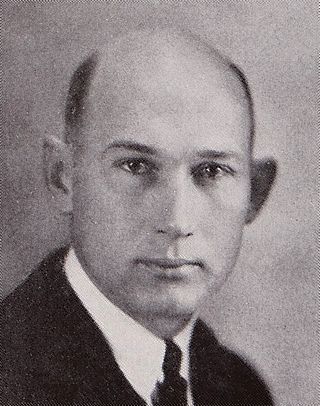
Elton Ewart "Tad" Wieman was an American college football player and coach and athletics administrator. He played football for the University of Michigan from 1915 to 1917 and 1920 under head coach Fielding H. Yost. He was a coach and administrator at Michigan from 1921 to 1929, including two years as the school's head football coach. Wieman served as a football coach at the University of Minnesota from 1930 to 1931, Princeton University from 1932 to 1942, and Columbia University from to 1945, and as an athletic director at the University of Maine from 1946 to 1951 and the University of Denver from 1951 to 1962. He was inducted into the College Football Hall of Fame as a coach in 1956.

The 1986 Michigan Wolverines football team was an American football team that represented the University of Michigan as a member of the Big Ten Conference during the 1986 NCAA Division I-A football season. In its 18th season under head coach Bo Schembechler, the team compiled an 11–2 record, tied for the Big Ten championship, outscored opponents by a total of 379 to 203, and was ranked No. 8 and No. 7, respectively, in the final AP and UPI polls. Late in the season, Schembechler passed Fielding H. Yost as the winningest coach in Michigan football history.

The 1985 Michigan Wolverines football team represented the University of Michigan in the 1985 Big Ten Conference football season. In their 17th year under head coach was Bo Schembechler, the Wolverines compiled a 10–1–1 record, outscored all opponents by a combined total of 342 to 98, defeated five ranked opponents, suffered its sole loss against Iowa in a game matching the #1 and #2 teams in the AP Poll, defeated Nebraska in the 1986 Fiesta Bowl, and were ranked #2 in the final AP and Coaches Polls.

The 1984 Michigan Wolverines football team was an American football team that represented the University of Michigan in the 1984 Big Ten Conference football season. In their 16th season under head coach Bo Schembechler, the Wolverines compiled a 6–6 record and outscored opponents by a total of 214 to 200. It was the only team in Michigan's 21 seasons under coach Schembechler that did not finish its season with a winning record.
The 1937 Michigan Wolverines football team was an American football team that represented the University of Michigan in the 1937 Big Ten Conference football season. In their ninth season under head coach Harry Kipke, the Wolverines compiled a 4–4 record and tied for fourth place in the Big Ten. Kipke was fired after the season, having compiled a 46–26–4 record in nine years as Michigan's head coach.
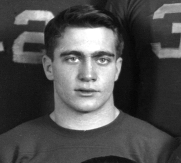
Henry Fonde was an American football player and coach. He played for the University of Michigan from 1945 to 1947 under head coach Fritz Crisler. In ten years as the head football coach at Ann Arbor Pioneer High School (1949–1958), he compiled a record of 69–6–4. He subsequently served as an assistant football coach at the University of Michigan under head coach Bump Elliott from 1959–1968.
Michael A. Taylor is a former American football player. He played at the quarterback position for the University of Michigan from 1986 to 1989, the final four years of Bo Schembechler's tenure as the school's head football coach. He was Michigan's starting quarterback in 1988 and 1989 and led the Wolverines to Big Ten Conference championships both years. He finished his career at Michigan as the school's all-time leader in passing efficiency.

Louis Matthew Gilbert was an American football player. He played at the halfback position for the Michigan Wolverines football teams from 1925 to 1927. He was selected as a first-team All-Big Ten Conference player in 1927 and was selected by Fielding H. Yost in 1941 as the greatest punter of all time.

George William Genyk was an American football lineman and coach.

The History of Michigan Wolverines football in the Yost era covers the period from the hiring of Fielding H. Yost as head coach in 1901 through Yost's firing of Tad Wieman as head coach after the 1928 season. The era includes the brief head coaching tenures of George Little and Tad Wieman. Wieman was head coach during the 1927 and 1928 seasons but contended that he had never truly been allowed to take control of the team with Yost remaining as an assistant coach and athletic director.
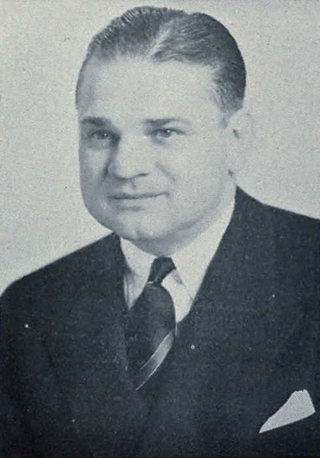
The history of Michigan Wolverines football in the Kipke years covers the history of the University of Michigan Wolverines football program during the period from the hiring of Harry Kipke as head coach in 1929 through his firing after the 1937 season. Michigan was a member of the Big Ten Conference during the Kipke years and played its home games at Michigan Stadium.

The History of Michigan Wolverines football in the Oosterbaan years covers the history of the University of Michigan Wolverines football program during the period from the promotion of Bennie Oosterbaan as head coach in 1948 through his firing after the 1958 season. Michigan was a member of the Big Ten Conference during the Oosterbaan years and played its home games at Michigan Stadium.

The promotion of Bump Elliott to head coach in 1959 defined a historical era of the University of Michigan Wolverines football through 1968 when he resigned after that season. Michigan was a member of the Big Ten Conference and played its home games at Michigan Stadium during the Elliott years. During the 10 years in which Elliott served as head football coach, Michigan compiled a record of 51–42–2 (.547) and claimed one Big Ten championship, one Rose Bowl victory, and two Chicago Tribune Silver Football awards for the most valuable player in the Big Ten. However, the Wolverines finished higher than third place in the Big Ten only twice.






